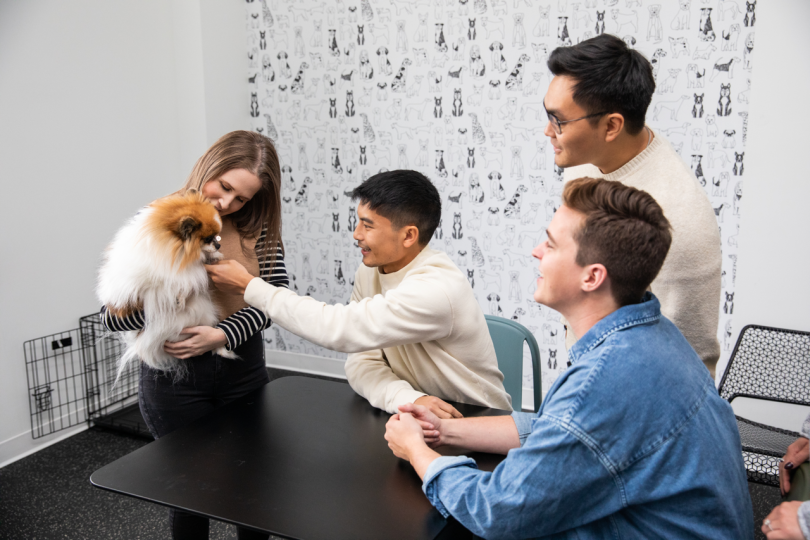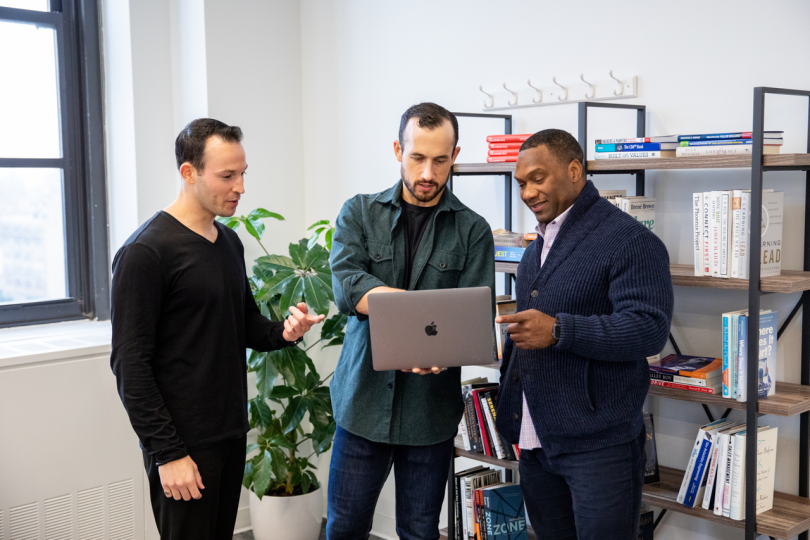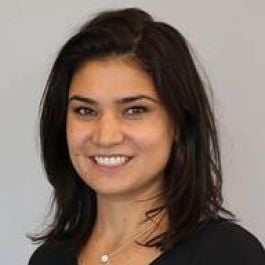Recent grad Stella Vujic finds her flow state in the bright spaces of Cedar’s Tribeca office.
Jaya Birch-Desai, a self-described people person, revels in her time at the Lower Manhattan workspace but enjoys hunkering down in her home office for intensive work.
Tim Kamanā savors working exclusively from his idyllic Cheyenne, Wyoming, home — just a room away from his wife and two-year-old son.
For all the disparate details of their lives, Vujic, Birch-Desai and Kamanā have one important factor in common: the power to choose their work style.
Understanding that hybrid work was going to become a ubiquitous part of our world, Cedar decided to operate across three modes of work: in-office, remote and flex. This choice is representative of Cedar’s care for the well-being of its stakeholders, extending beyond its customers to its employees, referred to as Cedarians.
WHAT CEDAR DOES
With over 100 million Americans embroiled in medical debt, it’s no secret that managing healthcare bills can be a daunting experience. Enter Cedar. The mission-driven company strives to empower patients to easily and affordably pursue the care they need and to take control of their healthcare journeys — from appointment confirmation to final payment. Backed by data science and interactive design, Cedar’s platform connects providers and payers in an effort to streamline the billing process for all.
“Patients and health systems are under a lot of pressure because of the economy, staffing shortages and healthcare post-Covid,” Birch-Desai, a director of research and insight at Cedar, told Built In. “Cedar is in a really good place to be able to benefit both parties, and we’re working toward making sure the right people hear the voices of the patients and providers we’re serving.”

Cedar’s Approach To Flex Work
Conversation with Vujic, Birch-Desai and Kamanā reveals a deep understanding of their working selves. Cedar’s employee-centered approach to work style encourages introspection about how each Cedarian works best — and why.
“Most of my team is fully remote, but, simply put, I work better in an office setting,” Vujic, a software engineer, said. “I enjoy the atmosphere of everyone working, and I find it to be a much less distracting space than my living room or bedroom.”
Vujic finds the airy office beautiful, and the rock-solid WiFi is certainly a draw, she said.
“Working in a space specifically designed for work provides the context switch I need to be productive,” Vujic added.
Birch-Desai, the director of research and insight, was also once a staunch advocate for in-office work, like Vujic. But in the aftermath of the pandemic, she has found a sense of balance.
“I joined the company during a big Covid spell in New York City,” Birch-Desai explained. “Everyone was working remotely at the time, and I didn’t get to meet anyone in person for the first few months.” When the new Cedar offices opened, Birch-Desai found herself both ready to be among her peers and equally happy to find a quiet workspace at home.
HAPPY HUMANS WORK HARDER
For Cedar, the choice to prioritize its employees’ wellbeing not only contributes to their personal happiness, it provides value for the company, too. A recent study at Oxford University revealed that there is a conclusive correlation between employee happiness and productivity rates — making Cedar’s “choose your own adventure” approach to work-life a win-win for all stakeholders.
It’s one of the qualities that drew Kamanā to Cedar. “Every single person I met in senior leadership — both in my time as an external consultant and an internal employee — seemed genuinely excited and happy about the work they’re doing,” Kamanā said. “Being able to see the reflection of the type of career I want within people high up in the company made joining Cedar one of the easiest decisions I’ve ever made.”
On the fully remote end of the spectrum, Kamanā, a technical recruiter, began working from home when the pandemic hit and hasn’t looked back. The flexibility is unparalleled, he said.
“I have a little one, Cannon, who’s two years old,” Kamanā said, grinning. “It’s been amazing to be around as he’s been growing up.”
Beyond affording him the chance to lend the occasional helping hand to his wife, a stay-at-home mom — “One of the hardest jobs out there, for sure,” Kamanā interjected — working from home has given him the space to build a life that’s right for his family.
And working remotely doesn’t mean being at home all the time. Kamanā, who recently moved from Seattle to Cheyenne, has traveled to Cedar’s HQ for work events, and his family spends time every year working from Hawaii, where he was born and raised.
“It’s a pretty beautiful thing,” he said.

Your Time is Yours
Beyond empowering Cedarians to thrive in their workspace of choice, the company’s pervasive culture puts its employees in command of their lives — in and outside of their work.
“It’s well understood from the top down that our work here isn’t the end-all be-all,” Kamanā said.
With one toddler and hope for more additions to his family, Kamanā is heartened by the family-forward scheduling he sees on his peers’ calendars. School drop-off and pickup, sports practices and doctor’s appointments: The multicolored calendar blocks tell an earnest story.
“We’re very intentional with our calendars, setting out working hours and boundaries for when we are free or not free,” Kamanā said. “We all want to be successful, and the team has high ownership over what they need to do in order to produce their best work.”
“We all want to be successful, and the team has high ownership over what they need to do in order to produce their best work.”
For Birch-Desai, that means blocking out time to move during the day. Her midday ritual of hitting the gym or the tennis courts is honored at Cedar — a boundary that is appreciated by Birch-Desai.
“At previous companies, people would book over my scheduled blocks,” she said. “But the respect people have for my calendar made me realize how well the culture works here.”
“We’re rejecting mediocrity and ensuring excellence across different work styles,” Kamanā said, as Vujic and Birch-Desai nodded. “At the core of this culture is an intentionality we all share.”








